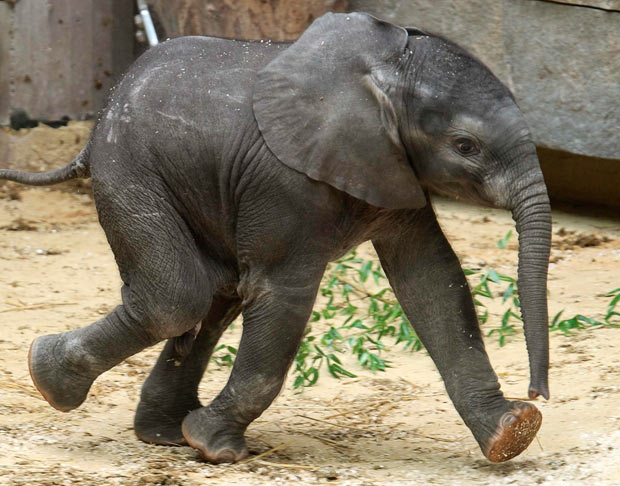Keep the Earth Diverse
This healthy African Elephant calf is part of a critically endangered species that is hunted down for their valuable tusks.
Aug 24, 2014
The Earth is home to billions of incredible organisms, ranging from massive mammals to creepy crawlers. Each year, thousands of new organisms are discovered around the world. However, 150-200 species go extinct in an estimated span of only 24 hours. Some people claim that the organisms dying out did not adapt quickly enough and therefore were wiped out. To some extent this may be true, but when there are less than 500 Siberian Tigers left in the wild, something is definitely wrong. We all learned in science class that without a healthy environment, life cannot be sustained. As people unceasingly pollute rivers and clear out forests, they commit genocide against animals. Just a few weeks ago, Australian authorities allowed the dumping of dredge spoil in 370,000 cubic meters of the Great Barrier Reef. Despite the many conservation organizations established to protect animals against atrocities like this, much is left undone. It is up to the public to decide the fate of these creatures.
“It’s very inconsiderate how people care only for their own needs. We should create more organizations, wildlife conservation parks and breeding programs to lessen our impact on our fellow animals,” sophomore Libertad Robledo said.
Initiatives, such as the hundreds of breeding programs, have helped repopulate many critically endangered species. A number of animals, such as the Black Footed Ferret and the Arabian Oryx, have been saved from the verge of extinction thanks to the practice of captive breeding. However, you don’t have to be a zookeeper to make a difference. There are simple tasks, like the ones mentioned below, that anyone can do to make a significant impact in conserving several species.
- Don’t ride the Elephants! – Elephant rides may seem extraneous for someone living in the United States, but are a popular tourist attraction in Asia. As tempting as it may seem, riding those elephants supports the lifelong torture of the animal and condones the captivity of such highly intelligent, migratory creatures. Not only that, the elephants used are exceedingly stressed out and can easily hurt anyone at whim.
- Read the back label – Today, in almost every food and cosmetic product, you can find the ingredient called Palm Oil. Palm Oil is grown in Asia and in thousands of acres of rain forests, which are home to the majestic Bornean Orangutans. A few ways one can save these great apes is by checking out the Palm Oil Shopping Guide, buying products that are Palm Oil free, or using the sustainable option. Plus, cutting Palm Oil out of your diet will help shed a few pounds and keep your heart healthy!
“I think that cutting down the homes of Orangutans is cruel. Sadly it isn’t the Palm Oil that is killing the Orangutans, it’s the people,” junior Kayla Pierre said.
- Use less water – Conserving water is one of the most well known ‘green’ tips, and the most ignored. If reducing your water usage is difficult, a simple way you could contribute is by using less water pressure. Not only will you help keep platypuses semi-aquatic, but your parents’ water bill will also be cut in half!
- Recycle those plastics! – This is the most basic conservation method out there. It is as simple as dumping papers and soda cans in the closest bin with the familiar circling arrow image. An easy task like this will keep Sea Turtles from mistakenly eating Publix plastic bags instead of delicious jellyfish.
“I don’t recycle on a regular basis, but when I have the chance, I do, because it benefits the environment and future generations,” freshman Melanie Wu said.
Keeping animals alive is up to humans, since we are the ones that have the biggest impact on the health of the world. By simply altering some of our daily habits, we can protect the millions of glorious animals that roam throughout the Earth.











